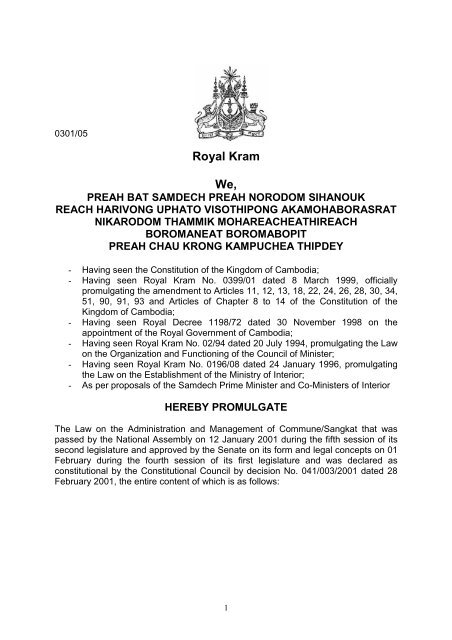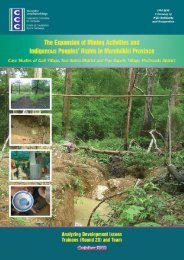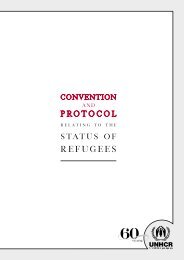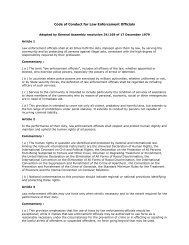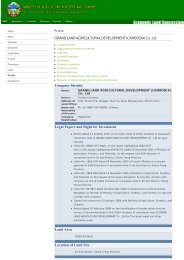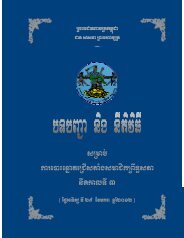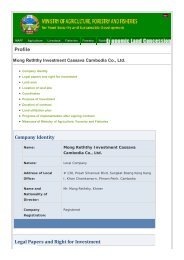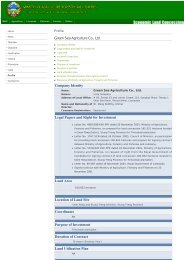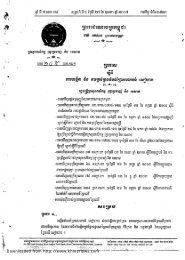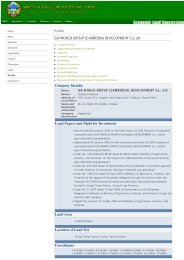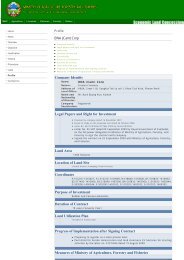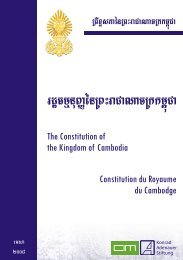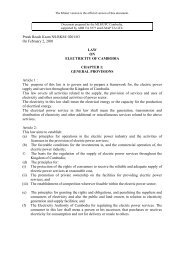English - Open Development Cambodia
English - Open Development Cambodia
English - Open Development Cambodia
Create successful ePaper yourself
Turn your PDF publications into a flip-book with our unique Google optimized e-Paper software.
0301/05<br />
Royal Kram<br />
We,<br />
PREAH BAT SAMDECH PREAH NORODOM SIHANOUK<br />
REACH HARIVONG UPHATO VISOTHIPONG AKAMOHABORASRAT<br />
NIKARODOM THAMMIK MOHAREACHEATHIREACH<br />
BOROMANEAT BOROMABOPIT<br />
PREAH CHAU KRONG KAMPUCHEA THIPDEY<br />
- Having seen the Constitution of the Kingdom of <strong>Cambodia</strong>;<br />
- Having seen Royal Kram No. 0399/01 dated 8 March 1999, officially<br />
promulgating the amendment to Articles 11, 12, 13, 18, 22, 24, 26, 28, 30, 34,<br />
51, 90, 91, 93 and Articles of Chapter 8 to 14 of the Constitution of the<br />
Kingdom of <strong>Cambodia</strong>;<br />
- Having seen Royal Decree 1198/72 dated 30 November 1998 on the<br />
appointment of the Royal Government of <strong>Cambodia</strong>;<br />
- Having seen Royal Kram No. 02/94 dated 20 July 1994, promulgating the Law<br />
on the Organization and Functioning of the Council of Minister;<br />
- Having seen Royal Kram No. 0196/08 dated 24 January 1996, promulgating<br />
the Law on the Establishment of the Ministry of Interior;<br />
- As per proposals of the Samdech Prime Minister and Co-Ministers of Interior<br />
HEREBY PROMULGATE<br />
The Law on the Administration and Management of Commune/Sangkat that was<br />
passed by the National Assembly on 12 January 2001 during the fifth session of its<br />
second legislature and approved by the Senate on its form and legal concepts on 01<br />
February during the fourth session of its first legislature and was declared as<br />
constitutional by the Constitutional Council by decision No. 041/003/2001 dated 28<br />
February 2001, the entire content of which is as follows:<br />
1
The Law<br />
on<br />
The Administration and<br />
Management of Commune/Sangkat<br />
2
Chapter 1<br />
General Provisions<br />
Article 1: This Law has its purpose to determine the administration and<br />
management of all communes/sangkats following the policy of decentralization.<br />
Article 2: Commune/Sangkat is the legal entity.<br />
Article 3: The system of local governance shall be implemented at commune/<br />
Sangkat level.<br />
Article 4: The power to govern and manage commune/Sangkat is derived from the<br />
general, universal, free and fair, equal, direct and secret vote within the framework of<br />
each commune/Sangkat.<br />
Article 5: A commune/Sangkat governs local affairs within its territory based on the<br />
Constitution, laws, Royal decrees, sub-decrees, proclamations (Prakas) and relevant<br />
legal instruments.<br />
The legislative and executive powers for local governing shall be vested to<br />
commune/Sangkat and these powers shall be implemented in conformity with the<br />
Constitution, laws, Royal decrees, sub-decrees, proclamations (Prakas) and relevant<br />
legal instruments.<br />
Article 6: The establishment, disestablishment and change of commune/Sangkat<br />
boundary and name shall be determined by sub-decree following the proposal of the<br />
Minister of Interior, in case of not affecting the boundary of the relevant provinces/<br />
municipalities.<br />
In case of affecting the boundary of the relevant provinces/municipalities, the<br />
establishment, disestablishment and change of commune/Sangkat boundary and<br />
name shall be determined by a Royal-decree following the proposal of the Prime<br />
Minister based on the proposal of the Minister of Interior.<br />
Article 7: If any consequence occurred after such establishment, disestablishment<br />
and change, the Minister of Interior shall issue a proclamation to resolve the<br />
consequence in accordance with the applicable laws and provisions.<br />
Article 8: Any commune/Sangkat which is unable to hold the election of Commune/<br />
Sangkat Council due to force majoeur, the Royal Government shall report to the<br />
National Assembly.<br />
After reporting to the National Assembly, the Royal Government shall designate the<br />
Ministry of Interior to provisionally manage that commune/Sangkat and the election<br />
of that Commune/Sangkat Council shall be held when the situation becomes normal.<br />
1
Chapter 2<br />
Commune/Sangkat Council<br />
Article 9: Each commune/Sangkat shall have a council, called the Commune/<br />
Sangkat Council.<br />
Commune/Sangkat Council is the body representing residents of its commune/<br />
Sangkat and shall have mission to serve general interests of its commune/Sangkat.<br />
Article 10: Commune/Sangkat Council shall be elected by residents of its<br />
commune/Sangkat in accordance with the procedures prescribed in the Law on the<br />
Election of Commune/Sangkat Councils.<br />
Article 11: A Commune/Sangkat Council shall have a 5-years mandate, and shall be<br />
expired when a new Commune/Sangkat Council holds the office.<br />
During the transitional period, the expired Commune/Sangkat Council shall carry out<br />
duties on daily basis only.<br />
Article 12: Each Commune/Sangkat Council shall have from 5 to 11 members,<br />
based on demography and geography.<br />
The actual number of councilors in each commune/Sangkat shall be determined by a<br />
sub-decree following the proposal of the Minister of Interior.<br />
The determined number of councilors of a Commune/Sangkat Council, may be<br />
changeable by a sub-decree following the proposal of the Minister of Interior due to<br />
the change of demography and geography.<br />
The new additional councilors of the Commune/Sangkat Council are elected in<br />
accordance with procedures applied to other councilors.<br />
Article 13: Commune/Sangkat Council shall have a chairman, called the Presiding<br />
councilor of the Commune/Sangkat Council.<br />
The Presiding councilor of the Commune/Sangkat Council shall have duties to:<br />
- Preside over the meeting of his/her Commune/Sangkat Council;<br />
- Ensure that the Commune/Sangkat Council meet at least once a month;<br />
- Ensure that the meeting of his/her Commune/Sangkat Council is properly held<br />
in accordance with rules and regulations stipulated in the internal rules and<br />
regulations of the Commune/Sangkat Council and provisions of Article 23 of<br />
this Law;<br />
- Maintain good order of the meeting.<br />
Article 14: Khmer citizens of both sexes who are eligible and intend to stand as a<br />
candidate for the election of Commune/Sangkat Council shall fulfill the following<br />
requirements:<br />
- Khmer nationality at birth;<br />
- Able to read and write Khmer script;<br />
2
- Is registered in the list of voters in the commune/Sangkat where he/she<br />
stands as a candidate for the election;<br />
- At least 25 years of age on the day of the election of Commune/Sangkat<br />
Council;<br />
- Having sufficient qualifications as prescribed in the Law on Elections of<br />
Commune/Sangkat Councils.<br />
Article 15: A Commune/Sangkat Council shall be elected in accordance with a<br />
system of proportional representation.<br />
Article 16: A Commune/sangkat Councilor shall lose his/her membership at one of<br />
the following cases:<br />
- He/she deceased;<br />
- He/she lost professional aptitude as certified by competent ministries or<br />
institutions;<br />
- He/she resigns in writing from Commune/Sangkat Councilor;<br />
- He/she is sentenced to prison by a court for felony or misdemeanors;<br />
- He/she is dismissed for contravening the internal rules an regulations of the<br />
Commune/Sangkat Council in terms of Article 84 of this law;<br />
- The entire Commune/Sangkat Council is dissolved;<br />
- He/she lost membership from his/her political party.<br />
When a Commune/Sangkat Councilor loses his/her membership, a candidate whose<br />
name is in order from the top of the same list of candidates shall be selected as a<br />
replacement without necessarily holding a by-election.<br />
Article 17: A by-election shall be held within a period of not later than 120 days, in<br />
order to elect a Commune/Sangkat Council, for one of the following cases:<br />
- The newly established commune/Sangkat in term of provisions of Article 6 of<br />
this Law;<br />
- Commune/Sangkat Council is dissolved in term of provisions of Articles 57<br />
and 58 of this Law;<br />
A by-election as prescribed above, shall be held in accordance with the formalities<br />
and the procedures provided in the Law on the Elections of Commune/Sangkat<br />
Councils.<br />
The mandate of the Commune/Sangkat Council established by the above by-election<br />
shall be equal the remaining mandate of the Commune/Sangkat Council.<br />
A by-election shall not be permitted to hold, if the remaining mandate of the<br />
Commune/ Sangkat Council is not more than 180 days.<br />
Within this period, the Minister of Interior shall appoint a composition and determine<br />
the competencies and methods to manage that commune/Sangkat until the election<br />
of Commune/sangkat Council for the next mandate is held.<br />
Article 18: The commune/Sangkat boundary may be changed only in the case that it<br />
does not change the number of elected Commune/Sangkat councilors.<br />
3
A new commune/Sangkat may be established only in case that it does not change<br />
the number of the concerned Commune/Sangkat Councilors.<br />
In case that the establishment, disestablishment or the change of boundary of a<br />
commune/Sangkat causes the change of the number of elected Commune/sangkat<br />
Councilors, such establishment, disestablishment or change of boundary of that<br />
commune/Sangkat shall take effect at the election of Commune/Sangkat Council for<br />
the next mandate.<br />
Article 19: The first meeting of a Commune/Sangkat Council shall be convened<br />
within 14 days after the Commune/Sangkat Council has been officially declared<br />
elected. This meeting shall be presided over by an official designated by the Minister<br />
of Interior in order to declare the validity of Commune/Sangkat Councilors, the<br />
presiding councilor of the Commune/Sangkat Council, chief and deputy chiefs of the<br />
commune/Sangkat.<br />
Article 20: Before commencing working, each Commune/Sangkat Council shall<br />
prepare and adopt the internal rules and regulations to determine rules for meetings<br />
and work proceedings.<br />
The Minister of Interior must issue an instruction concerning the principles to be used<br />
as a basis for the preparation of above internal rules and regulations.<br />
Article 21: Commune/Sangkat Council shall meet at least once a month.<br />
Commune/Sangkat Council shall hold meeting in its commune/Sangkat office or,<br />
when it is necessary, the chairman of the meeting may choose any place in its<br />
commune/ Sangkat to hold the meeting.<br />
Article 22: The meeting of a Commune/Sangkat Council shall be valid when it is<br />
participated by more than half of the entire Commune/Sangkat Councilors.<br />
The following matters shall be approved by absolute majority votes of the entire<br />
councilors:<br />
- Approval of commune/Sangkat development plans;<br />
- Approval of commune/Sangkat budgets;<br />
- Imposition of local fiscal taxes, local non fiscal taxes and other service<br />
charges;<br />
- Commune/Sangkat internal rules and regulations and commune/Sangkat<br />
resolutions;<br />
- Other affairs determined by the Minister of Interior.<br />
At the time of approval, if there is equality of votes, the vote of the chairman of the<br />
meeting shall prevail.<br />
Article 23: The meetings of the Commune/Sangkat Council shall be held in public<br />
and in democratic manner.<br />
The Commune/Sangkat Council may conduct secret meetings.<br />
4
The Minister of Interior shall issue an instruction concerning the procedures for the<br />
above meetings.<br />
Article 24: Commune/Sangkat Councilors are free to express opinions at the<br />
meetings of Commune/Sangkat Council.<br />
No Commune/Sangkat Councilor may be accused, arrested or detained because of<br />
expressing opinions or speech at the meetings of Commune/Sangkat Council.<br />
Chapter 3<br />
Administrative Structure of Commune/Sangkat<br />
Article 25: A commune/Sangkat administration shall be managed by a Commune/<br />
Sangkat Council.<br />
The Commune/Sangkat Council shall have a presiding councilor of the Commune/<br />
Sangkat Council.<br />
The presiding councilor of the Commune/Sangkat Council is the commune/Sangkat<br />
chief.<br />
Article 26: A commune/Sangkat chief shall have assistants as follows:<br />
A commune chief (Mékhum) has two assistants:<br />
- A first deputy chief (Chomtop Timoy);<br />
- A second deputy chief (Chomtop Tipi)<br />
A Sangkat chief (Chau-Sangkat) has two assistants:<br />
- A first deputy chief (Chav-Sangkat Rong Timoy);<br />
- A second deputy chief (Chav-Sangkat Rong Tipi).<br />
Article 27: A commune/Sangkat chief shall have rights to appoint various<br />
committees to give advice and to assist various affairs as necessary.<br />
The above committees may have any Commune/Sangkat Councilor as the president<br />
or any citizen who are entitled to vote in its commune/Sangkat rather than the<br />
councilor as the president.<br />
Article 28: Commune/Sangkat shall have a staff within the administrative framework<br />
of the Ministry of interior as a clerk.<br />
A clerk of commune/Sangkat shall be appointed by the Minister of Interior to assist<br />
the affairs of commune/Sangkat and to ensure continuity of administrative affairs of<br />
commune/Sangkat.<br />
The commune/Sangkat clerk may be changed upon request by commune/Sangkat<br />
chief following the decision of the Commune/Sangkat Council.<br />
Article 29: Commune/Sangkat may employ staff outside the state framework to<br />
assist its affairs according to working requirement and necessity, and at the decision<br />
5
of Commune /Sangkat Council in the mandate and his/her appointment may be<br />
extended by the decision of the Commune/Sangkat Council of the following<br />
mandate.<br />
Article 30: In the objective to promote the effectiveness of commune/Sangkat<br />
management, each Commune/Sangkat Council shall select a village chief for each<br />
village subjected to the commune/Sangkat.<br />
The Minister of Interior shall issue an instruction concerning the formalities and<br />
procedures for selecting the village chief, taking office, changing of village chief and<br />
appointment of village chief assistant.<br />
Article 31: The village chief shall have the following duties:<br />
- Implement duties vested to him/her by Commune/Sangkat Council or<br />
commune/Sangkat chief to ensure security, public order and socio-economic<br />
development in the village;<br />
- Give opinions to Commune/Sangkat Council on matters relating to the<br />
interests of his/her commune/Sangkat;<br />
- Seek for advice from Commune/Sangkat Council or commune/Sangkat chief<br />
to manage and facilitate affairs in his/her commune/Sangkat.<br />
The Minister of Interior shall issue additional guidelines on appropriate manner of<br />
working and carrying out duties in villages.<br />
Article 32: The presiding councilor of Commune/Sangkat Council who is the<br />
commune/Sangkat chief shall be selected from the candidate who is on the top of<br />
the candidate list that receives majority votes.<br />
The presiding councilor of the Commune/Sangkat Council who is the commune/<br />
Sangkat chief shall have equal mandate with the mandate of Commune/Sangkat<br />
Councilors.<br />
Article 33: The first deputy chief of commune/Sangkat shall be selected from the<br />
candidate whose name is on the top of candidate list that receives second majority<br />
votes.<br />
The second deputy chief of a commune/Sangkat shall be selected from the<br />
candidate whose name is on the candidate list that receives third majority votes.<br />
Article 34: In case that the official result of the election of any Commune/Sangkat<br />
Council supports only one candidate list that is qualified to receive all seats of the<br />
council, the councilors of the same list shall be selected to hold the positions as<br />
commune/Sangkat chief, first and second deputy chief of the commune/Sangkat.<br />
Article 35: In case that the official result of the election of any Commune/Sangkat<br />
Council supports only two candidate lists that are qualified to receive seats of the<br />
Council, the candidate who is the councilor on the second top of the list that receives<br />
majority votes shall be selected to hold a position as the first deputy chief of<br />
commune/Sangkat and the councilor who is the candidate on the top of the list that<br />
6
eceives second majority votes shall be selected to hold a position as the second<br />
deputy chief of commune/Sangkat.<br />
Article 36: The position of presiding councilor of the Commune/Sangkat Council<br />
who is the commune/Sangkat chief shall cease when the concerned person lost<br />
membership of Commune/Sangkat Council as prescribed in paragraph 1, Article 16<br />
of this Law.<br />
Article 37: The position of a presiding councilor of a Commune/Sangkat Council, a<br />
commune/Sangkat chief and a Commune/Sangkat Councilor, if one of the positions<br />
is ceased, all the above positions of that person shall also be ceased at the same<br />
time.<br />
In the above case, a councilor whose name is on the second top of the same list with<br />
the former presiding councilor and commune/Sangkat chief who ceased from the<br />
position shall be selected to hold the position as a presiding councilor of the<br />
Commune/ Sangkat Council and as the commune/Sangkat chief and a new councilor<br />
shall be selected to fill the vacancy as prescribed in paragraph 2, Article 16 of this<br />
Law.<br />
In case that the candidate list that holds the positions of the presiding councilor of<br />
Commune/Sangkat Council and as the commune/Sangkat chief is running out of its<br />
Councilor, a councilor of Commune/Sangkat Council shall be selected from the same<br />
candidate list as prescribed in Paragraph 2 Article 16 of this Law and this councilor<br />
shall hold the position of the presiding councilor of Commune/Sangkat Council and<br />
commune/Sangkat chief to replace the presiding councilor of Commune/Sangkat<br />
Council and commune/Sangkat chief who ceased from the position.<br />
In the above terms, the ceasing and the holding of a position as presiding councilor<br />
and commune/Sangkat chief shall be made by a proclamation of the Minister of<br />
Interior within a period of 14 days.<br />
Article 38: The first or second deputy chief of a commune/Sangkat shall cease from<br />
the position if he/she lost membership of Commune/Sangkat Council as prescribed<br />
in Article 16 of this Law.<br />
In case that the position of the first or second deputy chief of a commune/Sangkat is<br />
ceased, the position of councilor of Commune/Sangkat Council of that person is also<br />
ceased at the same time.<br />
In the above case, a councilor who is a candidate whose name is on the second top<br />
of the same candidate list with the first or second deputy chief of commune/Sangkat<br />
shall be selected to hold the position to replace the deputy chief who ceased from<br />
the position and a new councilor shall be selected to fill the vacancy as prescribed in<br />
Paragraph 2, Article 16 of this Law.<br />
In case that the candidate list that holds the position of the first or second deputy<br />
chief of the commune/Sangkat is running out of its councilor, a candidate from that<br />
list shall be selected as commune/Sangkat councilor as prescribed in paragraph 2<br />
Article 17 of this Law and this councilor shall be offered a position as first or second<br />
7
deputy chief of commune/Sangkat to replace the position of first or second deputy<br />
chief of commune/Sangkat who ceased from the position.<br />
Based on the above terms and the conditions provided in Article 33 of this Law, the<br />
ceasing and the holding of a position as the first or the second deputy chief of a<br />
commune/ Sangkat shall be made by a proclamation of the Minister of Interior within<br />
a period of not later than 14 days.<br />
Article 39: The presiding councilor of a Commune/Sangkat Council shall perform the<br />
following duties:<br />
- Implement the decisions of Commune/Sangkat Council;<br />
- Implement various rules and principles received from Commune/Sangkat<br />
Coucil;<br />
- Prepare reports on work performance to be submitted to his/her Commune/<br />
Sangkat Council at least once a month;<br />
- Give other opinions and assist the Commune/Sangkat Council to prepare<br />
financial planning and to carry out roles, functions and powers of the<br />
Commune/Sangkat Council and other affairs vested to him/her by the<br />
Commune/Sangkat Council.<br />
Article 40: The deputy chiefs of a commune/sangkat are assistants of the commune/<br />
Sangkat chief in implementation of duties assigned to him/her by the commune/<br />
Sangkat chief and to replace the commune/Sangkat chief, in order of hierarchy,<br />
when the commune/Sangkat chief is absent.<br />
The duties of the deputy chiefs of a commune/Sangkat shall be divided as follows:<br />
The first deputy chief shall assist commune/Sangkat chief on financial and economic<br />
matters.<br />
The second deputy chief shall assist commune/Sangkat chief on matters of<br />
administration, social affairs, public services and public orders.<br />
Commune/Sangkat may assign duties in addition to duties prescribed above to<br />
his/her deputy chiefs.<br />
Chapter 5<br />
Duties, Functions and Powers of<br />
of Commune/Sangkat Administration<br />
Article 41: Commune/Sangkat administration shall have duties to promote and<br />
support good governance by managing and using available resources in sustainable<br />
manner to meet the basic needs of its commune/Sangkat for serving the common<br />
interests of the residents and respect the national interests in consistence with the<br />
general policy of the State.<br />
Article 42: Commune/Sangkat shall have two types of roles as follows:<br />
- The roles to serve local affairs for the interests of commune/Sangkat and its<br />
residents;<br />
8
- The roles as an agent to represent the state under the appointment or<br />
delegation of power by the state authority.<br />
Article 43: Concerning the roles to serve local affairs, commune/Sangkat shall have<br />
duties to:<br />
- Maintain security and public orders;<br />
- Arrange necessary public services and be responsible for the good process of<br />
those affairs;<br />
- Encourage the creation of contentment and well-being of the citizens;<br />
- Promote social and economic development and upgrade the living standards<br />
of the citizens;<br />
- Protect and conserve the environment, natural resources and national culture<br />
and heritage;<br />
- Reconcile concepts of citizens to have mutual understanding and tolerance;<br />
- Perform general affairs to meet the needs of citizens.<br />
Article 44: Concerning the roles as an agent to represent the state, the commune/<br />
Sangkat shall have duties to comply with laws, Royal decrees, Sub-decrees,<br />
proclamations and other concerned legal instruments.<br />
In this case, the state authority may delegate powers to the commune/Sangkat,<br />
together with the increase of capacity and providing with means, materials and<br />
budgets for implementation.<br />
The above delegation of powers shall be applied to the collectivity of Commune/<br />
Sangkat Council only.<br />
Article 45: Commune/Sangkat administration shall have no power to decide on the<br />
following affairs:<br />
- Forestry<br />
- Post and telecommunication;<br />
- National defense;<br />
- National security;<br />
- Monetary;<br />
- Foreign policies;<br />
- Fiscal policies; and<br />
- Other fields prescribed in laws and relevant legal instruments.<br />
Article 46: The roles, duties and powers of the commune/Sangkat provided in<br />
Articles 42, 43 and 44 of this Law, apply only within the territorial jurisdiction of the<br />
commune/Sangkat.<br />
When there is a problem relating to competence of two or more communes/<br />
Sangkats, the Minister of Interior shall arrange for mediation between the concerned<br />
administrations.<br />
Article 47: Roles, functions and powers provided in Articles 42, 43, 44 and 45 of this<br />
Law, may be dealt with in details by a sub-decree following the proposal of the<br />
Minister of Interior.<br />
9
Article 48: A commune/Sangkat shall have legislative and executive powers.<br />
Legislative power of a commune/Sangkat shall be exercised through the resolutions<br />
of the commune/Sangkat to manage affairs within the framework of its duties,<br />
functions, and powers.<br />
Resolutions of a commune/Sangkat shall be made by decisions of the Commune/<br />
Sangkat Council and shall be signed by the chief of the commune/Sangkat.<br />
The commune/Sangkat shall publicly and immediately disseminate the adopted<br />
resolutions within its commune/Sangkat.<br />
Article 49: The resolutions of a commune/Sangkat shall be effective for the<br />
implementation within its territory only.<br />
The resolutions of a commune/Sangkat shall not be contradictory to the Constitution,<br />
laws, Royal decrees, sub-decrees and proclamations and relevant legal instruments.<br />
Any resolution made by a commune/Sangkat administration and is contradictory to<br />
the Constitution, laws, Royal decrees, Sub-decrees, proclamations and concerned<br />
legal instruments shall be abrogated.<br />
The Minister of Interior shall issue written notice on this abrogation to the concerned<br />
commune/Sangkat and shall disseminate it publicly.<br />
Article 50: The Minister of Interior shall issue a guideline on formalities and<br />
procedures so that commune/Sangkat prepares resolutions in accordance with<br />
situation within its commune/Sangkat.<br />
Article 51: A Commune/Sangkat Council may delegate powers to the chief of the<br />
commune/sangkat in accordance with the instructions of the Minister of Interior,<br />
except the following matters:<br />
- The adoption of commune/Sangkat budget plans;<br />
- The imposition of prices for local fiscal taxes, local non-fiscal taxes and fees<br />
for various service charges;<br />
- The voting to adopt internal rule and regulation and resolutions of commune/<br />
Sangkat;<br />
- The adoption of commune/Sangkat development plans;<br />
- Other matters determined by the Minister of Interior.<br />
The chief of a commune/Sangkat to whom powers are delegated by Commune/<br />
Sangkat Council cannot transfer these powers to other persons.<br />
Article 52: A Commune/Sangkat Council that has delegated powers to the chief of<br />
commune/Sangkat remains responsible for any affairs that have been delegated.<br />
The revocation of delegated power shall not affect the validity of affairs that have<br />
been performed.<br />
10
Chapter 5<br />
Monitoring, control and intervention<br />
Article 53: The Minister of Interior shall determine procedures for monitoring and<br />
control of the general activities of commune/Sangkat in order to:<br />
- Examine the legality of work management, exercise of powers and the<br />
performance of roles and duties of each commune/Sangkat;<br />
- Examine the evolution of capacity of communes/Sangkats;<br />
- Assess interventions and supports to be provided to commune/Sangkat to<br />
strengthen capacity of work management, the exercise of powers and the<br />
performance of roles and duties.<br />
Concerning monitoring, control and intervention of a commune/Sangkat, the Minister<br />
of Interior may share powers with the officials representing the Royal Government at<br />
the provincial/municipal, district/Khan territorial administration to assist these affairs<br />
according to work necessity.<br />
Article 54: The Minister of Interior shall intervene any commune/Sangkat that failed<br />
to perform duties required by laws so that these duties shall be performed<br />
immediately.<br />
Duties required by laws are the ones that Commune/Sangkat Council is obliged to<br />
fulfill in accordance with requirements of laws, Royal-decrees, sub-decrees,<br />
proclamation or internal rule and regulation and resolutions of commune/Sangkat.<br />
Article 55: Monitoring, control and intervention shall include:<br />
- Investigation and evaluation;<br />
- Issuance of written instructions to the Commune/Sangkat Council to carry out<br />
duties required by laws;<br />
- Taking over duties required by laws.<br />
Article 56: The intervention provided in Paragraph 1, Article 54 of this Law shall be<br />
reasonable and consistent with the size of affairs that the Commune/Sangkat<br />
Council failed to fulfill as required by laws by allying with necessary instruction and<br />
support so that the Commune/Sangkat Council is able to fulfill as normally required<br />
by laws.<br />
The Minister of Interior shall be entitled to enter into written agreement with any<br />
individual or any organization or issue written instruction to officials representing the<br />
Royal Government at provincial/municipal and district/Khan territorial administration<br />
to perform necessary wok to intervene on his behalf on any affairs.<br />
Article 57: If the intervention on one or some duties required by laws has not<br />
achieved result within the period of 6 months and the Commune/Sangkat Council<br />
generally fails to carry out duties required by laws, the Minister of Interior shall<br />
dissolve the Commune/Sangkat Council and by-election shall be held in accordance<br />
with the conditions provided in this Law and the Law on the Election of Commune/<br />
Sangkat Council.<br />
11
Article 58: In case that Commune/Sangkat Council conduct activity against the<br />
Constitution, the policies of the Royal Government, the Minister of Interior shall<br />
dissolve that Commune/Sangkat Council immediately and by-election shall be held<br />
to elect Council for that commune/Sangkat in accordance with provisions of this Law<br />
and the Law on the Election of Commune/Sangkat Council.<br />
Article 59: A unit subjected to the Ministry of Interior shall be created as a<br />
secretariat to deal with local affairs.<br />
The organization and functioning of this unit shall be determined by a Sub-decree<br />
following the proposal of the Minister of Interior.<br />
Chapter 6<br />
Commune/Sangkat development plans<br />
Article 60: The Commune/Sangkat Council shall prepare, adopt and implement<br />
commune/Sangkat development plans for the purpose of determining vision,<br />
program and development for its commune/Sangkat.<br />
Article 61: Commune/Sangkat development plans shall be compatible with national<br />
socio-economic development plan.<br />
Article 62: Commune/Sangkat development plans shall be approved by Commune<br />
/Sangkat Council within the first year of Commune/Sangkat Council's mandate and<br />
shall be reviewed and updated annually by its Commune/Sangkat Council in order to<br />
provide new data.<br />
Article 63: In the preparation of commune/Sangkat development plans, the<br />
Commune/Sangkat Council shall take the following measures:<br />
- Evaluation of the existing level of development and development activity in its<br />
commune/Sangkat;<br />
- Gathering all needs of commune/Sangkat and prioritizing those needs based<br />
on available resources of the commune/Sangkat and resources received;<br />
- Preparation of programs which may respond to various needs through the<br />
provision of services and development and all these programs shall be<br />
included in the annual budget of the commune/Sangkat;<br />
- Provision of services and development in accordance with its budget;<br />
- Monitoring and evaluation of the results of implementation of development<br />
plans.<br />
- Use of various results to evaluate the level of new development in its<br />
commune/Sangkat;<br />
- Reporting the results of implementation of commune/Sangkat development<br />
plans to the residents of its commune/Sangkat.<br />
The Commune/Sangkat Council shall conduct activities in a way that is consistent<br />
with its commune/Sangkat development plans.<br />
Article 64: The commune/Sangkat development plans shall be prepared in writing<br />
and shall have maps, statistics and other relevant documents attached to it.<br />
12
The commune/Sangkat development plans shall also determine methodologies and<br />
means to enable the residents of its commune/Sangkat to participate in the entire<br />
process.<br />
Article 65: In case that any commune development plans are prepared not in a way<br />
that is consistent with the requirements of this Law, the Minister of Interior shall<br />
advice the Commune/Sangkat Council to adjust its plans within 45 days after<br />
receiving a copy of these plans.<br />
The Commune/Sangkat Council shall adjust its commune development plans in<br />
accordance with the advice of the Minister of Interior.<br />
Article 66: Commune/Sangkat Council shall monitor, control and evaluate the<br />
implementation of plans, programs, projects and the provision of services with<br />
transparency and strong accountability.<br />
Article 67: Commune/Sangkat Council shall remain responsible for monitoring,<br />
control and evaluation of plans, programs and projects even these affairs are<br />
implemented by whatever composition that it has chosen.<br />
Article 68: The Minister of Interior shall instruct Commune/Sangkat Council on<br />
methods to implement plans and to monitor, control and evaluate the use of fund for<br />
commune/Sangkat development plans.<br />
Article 69: Commune/Sangkat Council shall prepare an annual report on:<br />
- Prioritized affairs and target for provision of services and development plans<br />
of commune/Sangkat of the previous years;<br />
- Results of implementation of prioritized affairs and target for provision of<br />
services and development plans of the commune/Sangkat;<br />
- Measures to better various fields that there have been defects in the<br />
implementation so far;<br />
- Prioritized affairs and target for provision of services and develop plans of<br />
commune/ Sangkat in current fiscal year.<br />
The Commune/Sangkat Council shall adopt this report not later than 45 days after<br />
the end of each fiscal year.<br />
Article 70: After being adopted by Commune/Sangkat Council, a copy of the annual<br />
report provided in Article 69 of this Law shall be:<br />
- Submitted to the Minister of Interior;<br />
- Retained for public uses;<br />
- Distributed to important organizations, associations and publics with cost of<br />
production shall be charged.<br />
Article 71: The Commune/Sangkat Council shall consider comments that are made<br />
to the report stipulated in Articles 69 and 70 of this Law and good comments shall be<br />
incorporated into Commune/Sangkat development plans.<br />
13
Article 72: The Minister of Interior shall consult with relevant Ministries/institutions to<br />
issue guidelines to Commune/Sangkat council to practically implement provisions<br />
stipulated in Chapter 6 of this Law.<br />
Chapter 7<br />
Commune/Sangkat Finances<br />
Article 73: The Commune/Sangkat shall have its own financial resources, budgets<br />
and assets.<br />
Article 74: The commune/Sangkat shall be entitled to own revenues from fiscal<br />
taxes, non-fiscal taxes and service charges.<br />
The above taxes include land tax, tax on immovable properties and rental tax.<br />
In case that the Ministry of Economy and Finance collects direct revenues of<br />
commune/Sangkat, this collection shall be conducted in the name of commune/<br />
Sangkat.<br />
Types, levels and procedures for the collection of the above fiscal taxes, non-fiscal<br />
taxes and services charge shall be determined by a law.<br />
Article 75: The commune/Sangkat is entitled to grant resource from the national<br />
revenues for its budget.<br />
The grant resources includes:<br />
- Complete or partial transfer of specific revenues from fiscal taxes and nonfiscal<br />
taxes of the state;<br />
- Endowment, grant resource, subsidy or transfer from the state revenue.<br />
The above grant resources shall be provided to commune/Sangkat through<br />
provincial/municipal treasury.<br />
The preparation and procedures for transferring the above grant resources shall be<br />
determined by a sub-decree.<br />
Article 76: Each commune/Sangkat is entitled to receive fees for the performance of<br />
agency functions representing the state as assigned to it by the Royal Government<br />
or any ministry/institution of the Royal Government.<br />
The above fees are supplementary to the revenues of the commune or to various<br />
grant that commune/Sangkat received from the state.<br />
The Royal Government or any Ministry/institution of the Royal Government shall<br />
provide appropriate fees to commune/Sangkat that performs agency functions as<br />
stated above.<br />
In case that the power or function of the state is permanently delegated to the<br />
commune/Sangkat, the Royal Government shall prepare a long term financial<br />
resources to be provided to the commune/Sangkat.<br />
14
The preparation of the above fees shall be determined by a sub-decree.<br />
Article 77: The state shall establish commune/Sangkat Fund.<br />
Commune/Sangkat Fund shall be established in order to transfer national revenues<br />
and other revenues to commune/Sangkat budget.<br />
The transfer of the national revenues to the above Fund shall be conducted by a<br />
specific formula or rate for the period of not less than three years and not more than<br />
5 years to be determined by a sub-decree.<br />
Procedures for practical implementation of this Article shall be determined by a subdecree.<br />
Article 78: The Commune/Sangkat Fund acquired from:<br />
- The grant of a specific portion of the state revenues from the annual state<br />
budget determined by a sub-decree;<br />
- Transfer and loan from sources inside and outside the country;<br />
The granting of annual resources to commune/Sangkat through Commune/Sangkat<br />
Fund shall be made in accordance with a formula to be determined by a sub-decree.<br />
The manner for organizing, the rule for use and procedures for withdrawing<br />
expenses from the Commune/Sangkat Fund shall be determined by a sub-decree.<br />
Article 79: Commune/Sangkat shall prepare and adopt its budget every year.<br />
Commune/Sangkat budget shall be prepared in a form and adopted within or before<br />
a period in conformity with the national budgetary system.<br />
Commune/Sangkat budget must be balanced between total revenues and total<br />
expenditures.<br />
Commune/Sangkat may increase the expenditure, but it shall be in consistence with<br />
its revenues.<br />
Commune/Sangkat budget shall reflect the priorities and needs of the development<br />
plans and investment programs of the commune/Sangkat.<br />
Procedures for preparing and adopting the above budget shall be determined by a<br />
sub-decree.<br />
Article 80: Commune/Sangkat shall have no right to get loans.<br />
Commune/Sangkat may not guarantee a loan or any other financial obligations.<br />
Article 81: Commune/Sangkat shall be entitled to the transfer of part of the state's<br />
assets as the asset of commune/sangkat.<br />
Commune/Sangkat shall well manage its own assets and assets vested to it by the<br />
state.<br />
15
Commune/Sangkat may use and generate incomes from assets vested to it by the<br />
state for management.<br />
Commune/Sangkat shall maintain and protect the assets vested to it by the state and<br />
commune/Sangkat shall have no right to sell or transfer the ownership or transfer the<br />
use without prior approval from the Minister of Economic and Finance following the<br />
approval of the Minister of Interior.<br />
The procedures for management and use of the above assets shall be determined<br />
by a sub-decree.<br />
Article 82: Commune/Sangkat shall create a system to manage, monitor and control<br />
its finance that includes:<br />
- Financial standards and the actual accounting practice;<br />
- The management of assets;<br />
- Various needs for audition;<br />
- Transparent, effective and accountable management of finance.<br />
A system for management, monitor and control of commune/Sangkat finance shall<br />
be determined by a sub-decree.<br />
Article 83: Commune/Sangkat financial regime and asset management shall be<br />
subjected to the control of the Ministry of Economy and Finance, after having agreed<br />
in principles with the Ministry of Interior.<br />
Chapter 8<br />
Penalty Provisions<br />
Article 84: Regardless of other felony, disciplinary actions shall be taken against any<br />
Commune/Sangkat Councilor who fails to follow the provisions of this Law.<br />
Disciplinary actions includes:<br />
- Reprimand at the meeting of Commune/Sangkat Council at which minutes<br />
shall be taken;<br />
- If he/she continues to commit offence, part or whole of his/her allowance shall<br />
be deducted.<br />
The disciplinary action which requires the deduct of part or whole of allowance as<br />
stated above may not be taken unless there is a prior approval from the Minister of<br />
Interior following the proposal of the Commune/Sangkat Council.<br />
The deducted allowance shall be the interest of budget of commune/Sangkat.<br />
In case the above two forms of disciplinary action have been taken, but the<br />
concerned person do not resolve to stop, the Commune/Sangkat Council may<br />
terminate that person from the position as Commune/Sangkat Councilor by the<br />
absolute majority votes of the entire Commune/Sangkat Council and a new councilor<br />
shall be selected as a replacement in accordance with Paragraph 2, Article 17 of this<br />
Law.<br />
16
In case that disciplinary action is taken against the presiding councilor of the<br />
Commune/ Sangkat Council who is the commune/Sangkat chief, any councilor of the<br />
Council shall be selected or an official shall be appointed by the Minister of Interior to<br />
chair the meeting of Commune/Sangkat Council to take the above disciplinary<br />
action.<br />
The official appointed by the Minister of Interior to chair the above meeting shall<br />
have no make decision.<br />
Chapter 9<br />
Transitional Provisions<br />
Article 85: To have a basis for organizing the elections of Commune/Sangkat<br />
Councils and the administration of Commune/Sangkat, the Minister of Interior shall<br />
issue a proclamation to determine the numbers, names and boundary of<br />
communes/Sangkats within the territory of the Kingdom of <strong>Cambodia</strong> not later than<br />
nine months before the date of the elections of the first mandate of<br />
Commune/Sangkat Councils.<br />
Article 86: After the elections of the first mandate of Commune/Sangkat Council,<br />
each Commune/Sangkat Council shall reappoint the chief of villages in its<br />
commune/Sangkat in accordance with procedures provided in Article 30 of this Law.<br />
Article 87: In order to facilitate the commune/Sangkat administration following the<br />
system of decentralization, an inter-ministerial committee called "the National<br />
Committee for Support to Communes/Sangkats" to be chaired by the Minister of<br />
Interior shall be established.<br />
The National Committee for Support to Communes/Sangkats shall be established by<br />
Royal decree, following the proposal of the Prime Minister.<br />
The National Committee for Support to Communes/Sangkats shall be established<br />
after this Law comes into force and shall terminate its mandate 9 months before the<br />
date of the elections of Commune/Sangkat Council for the following mandate.<br />
The National Committee for Support to Communes/Sangkats may have subcommittees<br />
as necessary.<br />
The National Committee for Support to Communes/Sangkats shall have a unit<br />
established in terms of Article 59 of this Law as a secretary.<br />
Article 88: The National Committee for Support to Communes/Sangkats shall have<br />
competences to make recommendations to the Ministry of Interior and the Royal<br />
Government on the following matters:<br />
- Research to redefine the boundaries of all communes/Sangkats in the<br />
Kingdom of <strong>Cambodia</strong>;<br />
- Division of functions, rights, powers and various duties between the Royal<br />
Government and commune/Sangkat and arrangement for coordination<br />
between two or more communes/Sangkats;<br />
- Training and capacity building for Communes/Sangkat Councils;<br />
17
- Arrangement for revenues and fiscal taxes for commune/Sangkat;<br />
- Technical support for communes/Sangkats;<br />
- Seeking for means to provide information and orientate public administration<br />
on the process of system of commune/Sangkat management following<br />
democracy and decentralization;<br />
- Making recommendations to the Royal Government on the implementation of<br />
policy of decentralization under the powers of this Law and making<br />
recommendations on public administration reform;<br />
- Drafting legal instruments for the implementation of this Law;<br />
- Sharing opinions on sub-decree relating to commune/Sangkat affairs;<br />
- Establishing the regime of transitional administrative management for<br />
commune/Sangkat that is not qualify to implement the policy of<br />
decentralization.<br />
Article 89: After the election of Commune/Sangkat Councils of the first mandate, the<br />
Minister of Interior may, based on the recommendations of the National Committee<br />
for Support to the communes/Sangkats, request for establishing, disestablishing and<br />
change of boundary or name of a commune/Sangkat as provided in Articles 6 and 18<br />
of this Law for the process of election of Commune/Sangkat Council for the second<br />
mandate.<br />
Chapter 10<br />
Final provisions<br />
Article 90:<br />
Any provision which is contrary to this Law shall be repealed.<br />
Phnom Penh, 19 March 2001<br />
In the Royal name and as ordered by the King<br />
Acting Head of State<br />
Signature<br />
Having submitted to<br />
the King for Royal signature<br />
Prime Minister<br />
Signature<br />
Chea Sim<br />
Hun Sen<br />
Having informed<br />
Samdech Prime Minister<br />
Co-Ministers of Interior No. 60<br />
Signature<br />
Copy for distribution<br />
Sar Kheng, You Hockry<br />
Phnom Penh 21 March 2001<br />
Secretary General of the<br />
Royal Government<br />
Nady Tan<br />
18


